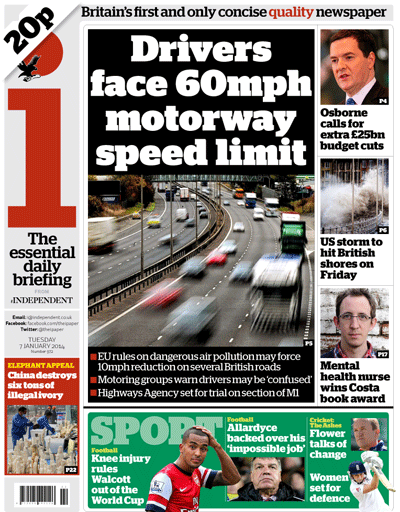i Deputy Editor's Letter: Variable speed limits won't impress Clarkson, but the theory is sound

Your support helps us to tell the story
From reproductive rights to climate change to Big Tech, The Independent is on the ground when the story is developing. Whether it's investigating the financials of Elon Musk's pro-Trump PAC or producing our latest documentary, 'The A Word', which shines a light on the American women fighting for reproductive rights, we know how important it is to parse out the facts from the messaging.
At such a critical moment in US history, we need reporters on the ground. Your donation allows us to keep sending journalists to speak to both sides of the story.
The Independent is trusted by Americans across the entire political spectrum. And unlike many other quality news outlets, we choose not to lock Americans out of our reporting and analysis with paywalls. We believe quality journalism should be available to everyone, paid for by those who can afford it.
Your support makes all the difference.
The Government’s proposal to introduce a 60mph speed limit on a 32-mile stretch of the M1 will draw a predictable response. Businesses and motoring groups will throw their arms up in horror, before claiming that the speed limit should actually be raised, so people can go quicker. Environmentalists will counter with claims that not enough is being done, and longer sections of motorway should be limited.
Variable speed limits are nothing new on Britain’s motorways. They have been widely used to reduce congestion since their introduction on the M42 in September 2006, but this is the first time they will be implemented in a bid to cut air pollution. Jeremy Clarkson won’t be impressed, but the theory is sound – most vehicles operate more efficiently when driving between 50-60mph. But when they are unable to move at much more than crawling pace, it doesn’t matter where the speed limit is set.
So it seems while pollution is given as the reason, the problem also lies with congestion. It may seem counter-intuitive but on an overcrowded road, reducing the overall limit will actually raise the average speed. And with less starting and stopping, fuel economies will rise, cutting pollution. And let’s not forget the added bonus of making the roads safer.
As we battle the dual problems of more vehicles on our roads and the high cost of fuel at the pumps, surely we should welcome anything which will make our journeys easier and cheaper. After all is said and done, a 10mph reduction in the speed limit for 32 miles will add less than five minutes to your journey time.
Join our commenting forum
Join thought-provoking conversations, follow other Independent readers and see their replies
Comments